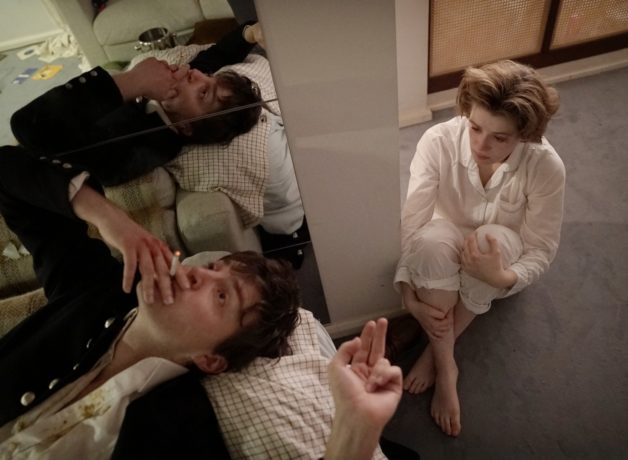Ilona Cheshire is a music supervisor and consultant and has worked across award-winning films, television and commercials, including The Wolf of Wall Street and Vinyl.
How did you come to be the music supervisor on The Souvenir? You’ve obviously previously worked on film and music and this would seem the perfect assignment for you.
It was something of a serendipitous moment in that I had recently returned from six months in New York having worked with the music supervisor on the soundtrack to an HBO series set in the music industry: Vinyl. Joanna and I had met for a coffee when she told me about her new work in progress and we discussed the use of a soundtrack to enrich the story as this was to be a personal project. When she learned that I had been working on the soundtrack to Vinyl the seed was sown and we began to talk creatively. About eight months later I was sent the first draft of the screenplay and then I could start getting a feel for the narrative and Joanna’s initial ideas.
What was the creative brief you were given? Joanna hasn’t previously used music in this way in her previous projects. The film is obviously about a specific decade, so as well as supposedly being part of the brief I imagine it also narrowed down your field of focus.
There wasn’t a brief as such, but a variety of tracks and artists were suggested in the first draft of the screenplay, such as Talking Heads, David Bowie, The Stranglers and Béla Bartók – Joanna was referencing music that she had listened to at the time The Souvenir was set. The recording of Bartók’s Bluebeard’s Castle was integral to the narrative and Joanna had a version from 1966, but it was doubtful whether we could use it for quite some time as the composer’s estate do not allow the inclusion of his work for film or TV. I spent a long time cajoling and negotiating with the rightsholders for access and even they were surprised that approval was granted.
In contrast to this score, most of the music required was time specific to 1982 – 1983, or just before and the well-known tracks first sought after were proving too expensive for the film’s budget. My feeling was that given the story, and Joanna’s anticipated audiences, less familiar songs would suit the characters and narrative while being easier on the fluctuating budget. I also identified points where diegetic music may be required to embellish the sense of realism, for instance the first party would feature a number of background tracks and as students I imagined that some of them would listen to John Peel and so The Fall would likely be on a cassette compilation brought along by one of the guests. I love detail. But I don’t feel that the years limited the variety.
There is a political element to the songs you choose (Shipbuilding for example). How conscious was this decision on your part?
It was a pro-active choice. From the start of the film we learn the subject matter of Julie’s documentary project which to me sang Shipbuilding! And when I suggested the Robert Wyatt version to Joanna I was so glad that she liked it as his voice is beautifully haunting and it still gives me goosebumps. The tense political climate of the time is present in the narrative – the IRA are referenced, the Falklands War was in ’82 – and I imagine that anyone with a memory of that period would feel it echoed in the shadows of The Souvenir. Similarly, Jona Lewie’s Stop the Cavalry adds a hint of common fears and frustrations of the time – it was a protest song.
What were the tracks that you were especially keen to secure and alternatively were there selections that you suggested for use which for one reason or another couldn’t be incorporated?
There was one track that I had been very keen to include as the accompaniment to the dinner party. This is a pivotal scene and for a long time it was without background music, but I felt that for authenticity these characters would likely be playing music: this is Julie’s flat and she’s creative though shy and nervous in front of Anthony’s friends who she may want to impress, plus music provides a distraction and can be an awkward silence filler. The song that I had suggested could have created a playful reveal of inner feelings, but library music was used at the final stages of post-production, if I recall correctly. And because I adore the song so much I’m not going to share! I’m determined to find an aural partnering for it somewhere else… I will say that I had championed Christmas Wrapping by The Waitresses over The Pretenders, but that’s just my personal fondness.
Were you also keen that the music be diverse? It runs the gamut from post punk to reggae…
Authenticity was more of a priority for me and listening to Joanna’s ideas and ideals, so that I could provide alternatives that complemented her vision, choices and memories. The screenplay noted clothes that Julie wore were often post-punk crossing into new romantic, so this gave further indication of the character’s aesthetics and milieu, while Joanna suggested Glen Miller for the scene with Julie’s mother, music for another generation. What Julie listens to tends to differ from Anthony and the music changes through the film with the progression of her character.
What was your reaction to seeing the finished the film and witnessing how the songs fitted with the narrative and with the characters?
I always find it hard to put personal experience aside when watching a film or programme that I’ve worked on, memories are triggered and I can’t get caught up in the narrative, but watching the final draft was satisfying. Of course there are always alternative ideas and so much can change in post, but I was happy that artists such as Robert Wyatt made it through as I hope that a few more people will discover him, plus I could give myself a knowing wink as in the scene before Shipbuilding Anthony refers to William Burroughs’ The Soft Machine which was also the name of Wyatt’s former band.
What are your future plans? More supervision work? What would be the dream assignment?
I’ve a couple of projects percolating and as for a dream assignment…I wish that I’d been able to work on Boardwalk Empire as that era of music holds great appeal to me, but as I can’t rewind time I will cross my fingers that a WWII to late 50s set project with plenty of jazz required comes my way as I would welcome it warmly. I’d also like to find a TV series with interesting character development, taking place over a few years, maybe starting in the early 90s so that I could put records from my guitar-addicted youth to use.
Interview by Jason Wood, HOME’s Creative Director: Film and Culture.

